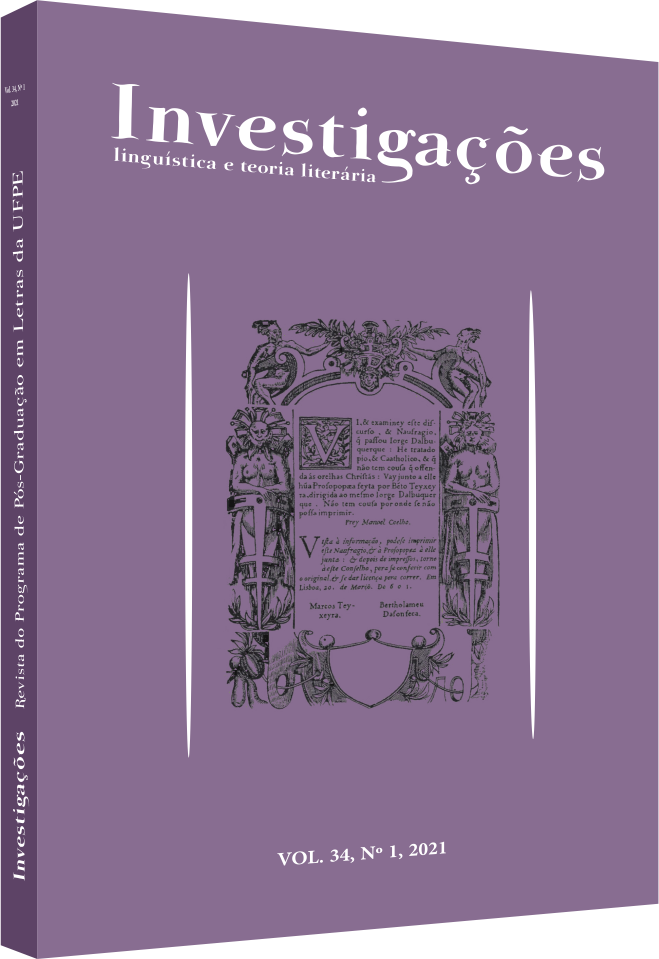Trauma, escrita e silêncio em Diário da queda, de Michel Laub, e em O que os cegos estão sonhando?, de Noemi Jaffe
DOI:
https://doi.org/10.51359/2175-294x.2021.249754Keywords:
Michel Laub, Noemi Jaffe, Shoah, trauma.Abstract
Over the past few decades, Shoahhas been recalled in the works of several authors around the world. In contemporary times, the approach to the theme from the standpoint of individual stories stands out. In the present work, we analyze how Michel Laub and Noemi Jaffe articulate trauma, writing and silence in the construction of their works, the novel Diário da queda and the commented diary O que os cegos estão sonhando?, respectively. We investigate how both writers resignify the memory of a collective historical trauma –the Holocaust –in the light of individual experience.References
FERREIRA, Alice Cardoso Ferreira. “Testemunho e pós-memória em Noemi Jaffe e Michel Laub”. Anais Abralic, 2017. 1. v. p. 6380-6389. Disponível em: https://abralic.org.br/anais/?p=3&ano=2017. Acesso em 13 de janeiro de 2021.
GAGNEBIN, Jeanne Marie. Lembrar escrever esquecer. São Paulo: Ed 34, 2006.
JAFFE, Noemi. O que os cegos estão sonhando? com o Diário de Lili Jaffe (1944-1945). São Paulo: Ed. 34, 2012.
LAUB, Dori. “An event witout a witness: truth, testimony and survival”. In: FELMAN, Shoshana (Org.). Testimony: crises of Witnessing in Literature, Psychoanalysis and History. Routledge: New York, 1992. p. 75-90.
LAUB, Michel. Diário da Queda. São Paulo: Companhia das Letras, 2011.
LEVI, Primo. Os afogados e os sobreviventes. Tradução Luiz Sérgio Henriques. Rio de Janeiro: Paz e Terra, 1990.
LEVI, Primo. É isto um homem? Tradução de Luigi Del Re. Rio de Janeiro: Rocco, 1988.
OLIVEIRA, Lucal Amaral de. “O testemunho ético de Primo Levi sobre a zona cinzenta: um problema de julgamento e representação”. Patrimônio e memória. São Paulo, Unesp, v. 13, n. 1, p. 103-130, janeiro-junho, 2017.
PAULA, Marcelo Ferraz de. “O testemunho oblíquo em O que os cegos estão sonhando?, de Noemi Jaffe, e Maus, de Art Spiegelman”. Estudos de literatura brasileira contemporânea, n. 55, p. 285-308, set./dez. 2018.
PRADO, Rafael Barreto do. Imagens de língua na prosa literária brasileira: as narrativas do século XXI. 2016. 212 f. Tese (Doutorado em Letras) – Universidade de São Paulo, São Paulo, 2016.
RODRIGUES, Breno Fonseca. “Memória e testemunho: a fragilidade da narrativa em O que os cegos estão sonhando?, de Noemi Jaffe”. Arquivo Maaravi: Revista Digital de Estudos Judaicos da UFMG. Belo Horizonte, v. 10, n. 18, maio 2016. Disponível em: https://periodicos.ufmg.br/index.php/maaravi/article/view/14308/pdf. Acesso em: 18 de janeiro de 2021.
SELIGMANN-SILVA, Márcio. “Trauma, lei e literatura: o olhar crítico de Shoshana Felman sobre o Direito (Prefácio)”. In: FELMAN, Shoshana. O inconsciente jurídico: julgamentos e traumas do século XX. Tradução Ariani Bueno Sudatti. São Paulo: Edipro, 2014. p. 7-13.
SELIGMANN-SILVA, Márcio. Literatura da Shoah no Brasil. Arquivo Maaravi: Revista Digital de Estudos Judaicos da UFMG. Belo Horizonte, v. 1, n. 1, out. 2007. Disponível em: http://www.periodicos.letras.ufmg.br/index.php/maaravi/article/view/977/1086. Acesso em: 19 de janeiro de 2021.
Downloads
Published
How to Cite
Issue
Section
License
Copyright (c) 2021 Sileyr dos Santos Ribeiro

This work is licensed under a Creative Commons Attribution 4.0 International License.
Authors who publish with Revista Investigações agree to the following terms:
Authors retain copyright and grant the journal right of first publication with the work simultaneously licensed under the Creative Commons Attribution 4.0 International (CC BY 4.0) license that allows others to share the work with an acknowledgement of the work's authorship and initial publication in this journal.
Authors are able to enter into separate, additional contractual arrangements for the non-exclusive distribution of the journal's published version of the work (e.g., post it to an institutional repository or publish it in a book), with an acknowledgement of its initial publication in this journal.
You are free to:
Share — copy and redistribute the material in any medium or format for any purpose, even commercially.
Adapt — remix, transform, and build upon the material for any purpose, even commercially.
The licensor cannot revoke these freedoms as long as you follow the license terms.
Under the following terms:
Attribution — You must give appropriate credit , provide a link to the license, and indicate if changes were made . You may do so in any reasonable manner, but not in any way that suggests the licensor endorses you or your use.
No additional restrictions — You may not apply legal terms or technological measures that legally restrict others from doing anything the license permits.

